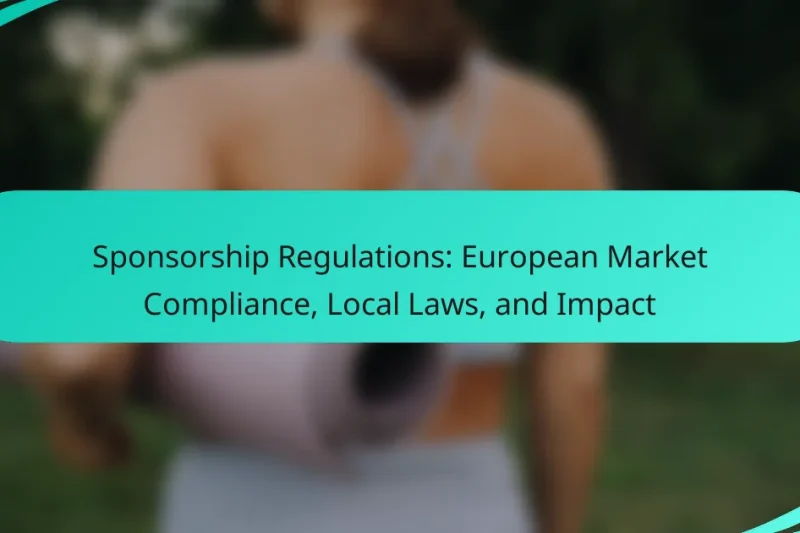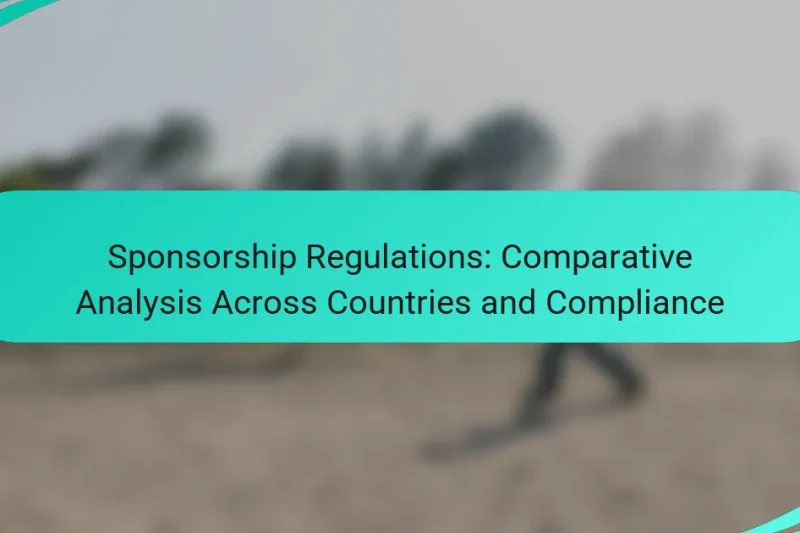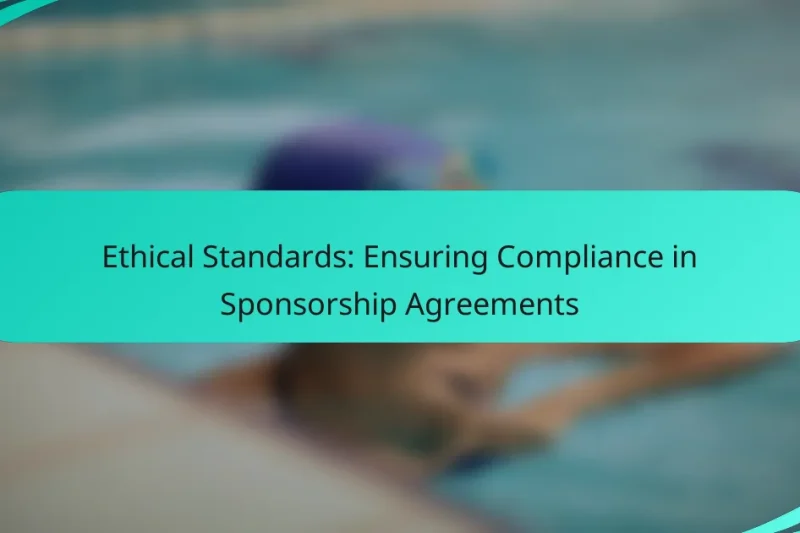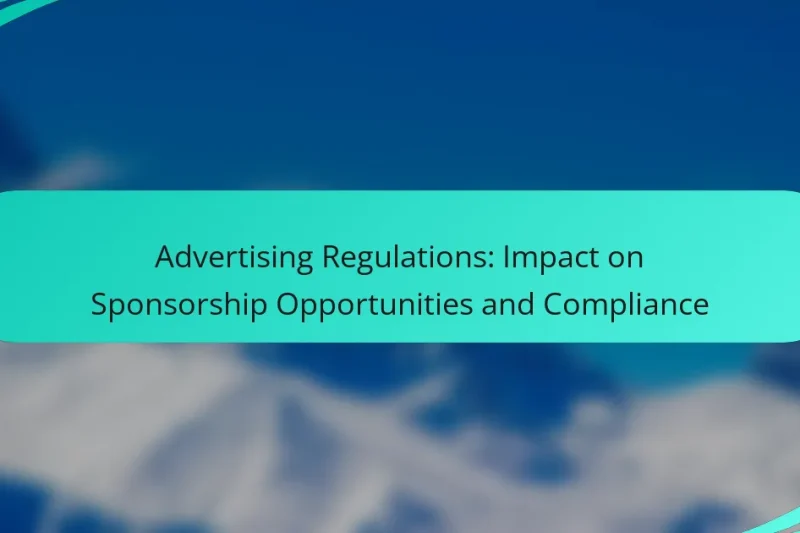Governing bodies play a vital role in regulating sponsorship practices by setting guidelines that promote transparency, … Governing Bodies: Role in Regulating Sponsorship Practices and StandardsRead more
Global Sponsorship Regulations
Global sponsorship regulations establish essential standards and guidelines that govern sponsorship activities across various regions and industries. These regulations promote transparency and compliance with local laws, while also encouraging responsible advertising practices. Understanding the differences in these regulations is vital for businesses seeking to engage in cross-border sponsorships, as non-compliance can result in legal penalties and reputational harm.
Sponsorship Regulations: European Market Compliance, Local Laws, and Impact
Sponsorship regulations in Europe encompass a variety of laws and guidelines that govern data protection, advertising … Sponsorship Regulations: European Market Compliance, Local Laws, and ImpactRead more
Global Sponsorship Deals: Navigating Compliance Issues and Best Practices
Global sponsorship deals present unique compliance challenges that require careful navigation of regulatory requirements, intellectual property … Global Sponsorship Deals: Navigating Compliance Issues and Best PracticesRead more
Sponsorship Regulations: Comparative Analysis Across Countries and Compliance
This analysis explores the diverse sponsorship regulations across the United States, United Kingdom, and Canada, highlighting … Sponsorship Regulations: Comparative Analysis Across Countries and ComplianceRead more
Ethical Standards: Ensuring Compliance in Sponsorship Agreements
Ethical standards in sponsorship agreements are crucial for maintaining integrity and fairness among all parties involved. … Ethical Standards: Ensuring Compliance in Sponsorship AgreementsRead more
Advertising Regulations: Impact on Sponsorship Opportunities and Compliance
Advertising regulations play a crucial role in shaping sponsorship opportunities by establishing guidelines that brands must … Advertising Regulations: Impact on Sponsorship Opportunities and ComplianceRead more
Athletic Sponsorship Agreements: Local Laws, Compliance, and Opportunities
Athletic sponsorship agreements play a vital role in the relationship between sponsors and athletes, encompassing key … Athletic Sponsorship Agreements: Local Laws, Compliance, and OpportunitiesRead more
What are the key global sponsorship regulations?
Global sponsorship regulations encompass a variety of standards and guidelines that govern how sponsorships are conducted across different regions and industries. These regulations ensure transparency, fairness, and compliance with local laws while promoting responsible advertising practices.
International Advertising Standards
International advertising standards set the framework for ethical and responsible sponsorship practices globally. These standards, often established by organizations such as the International Chamber of Commerce (ICC), emphasize honesty, transparency, and respect for consumer rights. Adhering to these guidelines helps brands maintain credibility and avoid legal issues.
For example, sponsorship messages should not mislead consumers about the nature of the sponsorship or the products being promoted. Brands should also be cautious about targeting vulnerable populations, ensuring that their messages are appropriate and respectful.
Local Compliance Requirements
Local compliance requirements vary significantly from one country to another and can include specific laws regarding advertising, consumer protection, and sponsorship disclosures. For instance, in the European Union, regulations mandate clear labeling of sponsored content to avoid misleading consumers. In the United States, the Federal Trade Commission (FTC) requires that sponsorships be disclosed prominently.
Brands must conduct thorough research to understand the local regulations applicable to their sponsorship activities. Failure to comply can result in fines, legal action, or damage to brand reputation. A checklist for compliance might include reviewing local advertising laws, ensuring proper disclosures, and consulting legal experts when necessary.
Industry-Specific Guidelines
Different industries often have unique guidelines that govern sponsorship practices. For example, the sports industry may have specific rules from governing bodies like FIFA or the International Olympic Committee regarding sponsorship visibility and athlete endorsements. Similarly, the alcohol industry is subject to strict regulations concerning advertising to minors and responsible drinking messages.
Brands should familiarize themselves with these industry-specific guidelines to ensure their sponsorships align with best practices and legal requirements. Engaging with industry associations can provide valuable resources and insights into maintaining compliance and enhancing brand reputation within the sector.
How do global sponsorship regulations vary by region?
Global sponsorship regulations differ significantly by region, influenced by local laws, cultural norms, and industry practices. Understanding these variations is crucial for businesses looking to engage in sponsorship activities across borders.
North America Regulations
In North America, particularly the United States and Canada, sponsorship regulations are shaped by both federal and state/provincial laws. Sponsorship agreements often require clear disclosures, especially in advertising, to ensure transparency and consumer protection.
For example, the Federal Trade Commission (FTC) in the U.S. mandates that sponsorships must be disclosed in a clear manner, particularly in social media and influencer marketing. Businesses should ensure that all sponsored content is labeled appropriately to avoid misleading consumers.
European Union Directives
The European Union has established comprehensive directives that govern sponsorship, focusing on consumer rights and data protection. The General Data Protection Regulation (GDPR) plays a significant role in how sponsorship data is collected and used, requiring explicit consent from individuals.
Additionally, sponsorships must comply with local advertising standards, which can vary between member states. Companies should familiarize themselves with these regulations to ensure compliance and avoid hefty fines.
Asia-Pacific Compliance
In the Asia-Pacific region, sponsorship regulations can vary widely from country to country, influenced by local customs and legal frameworks. Countries like Australia have strict advertising standards, while others may have more lenient regulations.
For instance, in Australia, the Australian Competition and Consumer Commission (ACCC) enforces rules that require sponsorships to be disclosed clearly. Businesses should conduct thorough research on the specific regulations in each country to ensure compliance and build trust with local audiences.
What are the implications of non-compliance with sponsorship regulations?
Non-compliance with sponsorship regulations can lead to serious consequences, including legal penalties, reputational damage, and financial losses. Organizations must adhere to these regulations to avoid significant risks that can impact their operations and public image.
Legal Penalties
Violating sponsorship regulations can result in legal penalties, which may include fines, sanctions, or even the revocation of licenses. The severity of these penalties often depends on the nature of the violation and the jurisdiction in which it occurs.
For example, in the European Union, non-compliance could lead to fines that range from thousands to millions of euros, depending on the breach’s impact. Organizations should ensure they are familiar with the specific laws applicable in their region to mitigate these risks.
Reputational Damage
Non-compliance can severely damage an organization’s reputation, leading to a loss of trust among consumers and partners. Once a brand is associated with regulatory violations, it can take years to rebuild its image.
Public backlash may occur, especially if the non-compliance is widely reported in the media. Companies should proactively manage their sponsorship practices and maintain transparency to protect their reputation.
Financial Consequences
The financial consequences of failing to comply with sponsorship regulations can be substantial. Beyond potential fines, organizations may face increased operational costs due to legal fees and the need for compliance audits.
Additionally, lost sponsorship opportunities can significantly impact revenue. Companies should regularly review their sponsorship agreements and compliance measures to avoid these financial pitfalls.
How can businesses ensure compliance with global sponsorship regulations?
Businesses can ensure compliance with global sponsorship regulations by implementing a structured approach that includes regular audits, consulting legal experts, and providing compliance training for employees. These steps help organizations navigate complex legal landscapes and mitigate risks associated with sponsorship activities.
Regular Audits and Assessments
Conducting regular audits and assessments is crucial for maintaining compliance with sponsorship regulations. These audits should evaluate current sponsorship agreements, marketing materials, and promotional activities to ensure they align with local and international laws.
Businesses should schedule audits at least annually, but more frequent checks may be necessary in dynamic markets. Utilizing a checklist can help identify potential compliance gaps, such as undisclosed sponsorships or misleading advertising practices.
Consulting Legal Experts
Engaging legal experts who specialize in sponsorship regulations can provide invaluable guidance. These professionals can help interpret complex laws and ensure that sponsorship agreements are drafted in compliance with applicable regulations.
Consider establishing a relationship with a legal advisor who has experience in the specific markets where the business operates. This can help preemptively address legal issues and adapt to changes in regulations, reducing the risk of costly penalties.
Implementing Compliance Training
Implementing compliance training programs for employees involved in sponsorship activities is essential for fostering a culture of compliance. Training should cover relevant laws, ethical standards, and the company’s specific policies regarding sponsorships.
Regular training sessions, ideally conducted quarterly, can keep employees informed about updates in regulations and best practices. Additionally, providing resources such as quick reference guides can empower staff to make informed decisions in their sponsorship roles.
What are the best practices for navigating sponsorship regulations?
To effectively navigate sponsorship regulations, organizations should prioritize staying informed about legal requirements, engaging with regulatory bodies, and utilizing compliance software. These practices help ensure adherence to local and international laws while minimizing risks associated with sponsorship activities.
Staying Updated with Changes
Regulations governing sponsorship can change frequently, making it essential to stay updated. Subscribe to industry newsletters, follow relevant regulatory websites, and participate in webinars to receive timely information about new laws or amendments.
Establish a routine for reviewing regulatory updates at least quarterly. This proactive approach can help identify potential compliance issues before they arise, allowing for timely adjustments to sponsorship strategies.
Engaging with Regulatory Bodies
Building relationships with regulatory bodies can provide valuable insights into compliance expectations. Attend industry conferences and engage in discussions with representatives to clarify any uncertainties regarding sponsorship regulations.
Consider joining industry associations that facilitate communication with regulators. These organizations often provide resources and advocacy that can help navigate complex regulatory landscapes effectively.
Utilizing Compliance Software
Compliance software can streamline the process of managing sponsorship regulations by automating tracking and reporting. Look for solutions that offer features such as real-time alerts for regulatory changes and document management tools.
When selecting compliance software, evaluate options based on user-friendliness, integration capabilities, and customer support. Investing in the right technology can save time and reduce the risk of non-compliance in sponsorship activities.
What are the emerging trends in global sponsorship regulations?
Emerging trends in global sponsorship regulations focus on increased transparency, accountability, and compliance with local laws. Organizations are adapting to stricter guidelines that govern sponsorship agreements, particularly in areas like advertising disclosures and ethical standards.
Increased Transparency Requirements
Many countries are implementing stricter transparency requirements for sponsorship deals. This includes mandatory disclosure of sponsorship amounts and the identities of sponsors. For example, in the European Union, regulations now require that sponsorships in media must be clearly labeled to inform viewers about the financial backing behind content.
Organizations must ensure that all sponsorship agreements are documented and accessible to stakeholders. This can help build trust and credibility with audiences, as well as comply with legal standards.
Focus on Ethical Standards
There is a growing emphasis on ethical standards in sponsorship agreements, particularly concerning vulnerable populations. Sponsorships targeting children or promoting unhealthy products face heightened scrutiny. Companies are encouraged to adopt ethical guidelines that prioritize consumer welfare and social responsibility.
For instance, brands are increasingly avoiding sponsorships that could be perceived as exploiting vulnerable groups, such as children or low-income communities. This shift not only aligns with public sentiment but also mitigates potential backlash.
Cross-Border Compliance Challenges
As sponsorships often cross international borders, companies must navigate varying regulations in different jurisdictions. This can lead to complexities in compliance, as what is acceptable in one country may not be in another. For example, sponsorship laws in the United States can differ significantly from those in the UK or Australia.
To address these challenges, organizations should conduct thorough research on the legal landscape in each market they operate. Consulting with legal experts familiar with local sponsorship regulations can help avoid costly missteps.
Digital Sponsorship Regulations
The rise of digital platforms has prompted new regulations regarding online sponsorships. Many jurisdictions are now requiring clear disclosures for sponsored content on social media and other digital channels. This includes labeling posts as sponsored or paid partnerships to maintain transparency with audiences.
Brands should develop clear guidelines for their digital sponsorships, ensuring compliance with local laws. This may involve training marketing teams on proper disclosure practices and regularly reviewing content for adherence to regulations.






